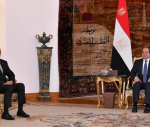You are here
Turkey’s day after
Jul 19,2016 - Last updated at Jul 19,2016
Reverberations from last Friday’s failed military coup attempt in Turkey will last for a long time. It is a major milestone in the country’s chequered political history and may signal a departure from the course that President Recep Tayyip Erdogan had charted for Turkey since he took over as prime minister back in 2003, particularly in the aftermath of the so-called Arab Spring and the eruption of the Syrian crisis.
The dust has not settled yet and we know little about the circumstances of the violent evening when renegade officers attempted to hijack Turkey’s democratic process and end decades of civilian rule.
But the tumults of that evening have given us some indications over where Turkey stands today and where it will be heading next. One thing is clear and that is Turkey’s stability and the fate of its strongman underlines its remarkable weight in regional, European and indeed world affairs.
There is no doubt that some leaders had wished for the coup to succeed hoping to see an end to the often contentious rule of Turkey’s Erdogan. They were deeply disappointed as dawn broke bringing with its unfavourable news.
Turkey’s past military coups cast a heavy shadow on the country on that moon-lit evening. Erdogan’s popularity among his countrymen is a matter for debate. But he remains a democratically elected president and a leader who has invigorated, and often manipulated, the democratic process in a country that had seen years of despotism at the hands of the military junta. Divided or not, the Turkish people were instrumental in foiling the military coup.
There will be many articles written about the role of social media in penetrating the military’s imposed news blackout. A simple video communications mobile app allowed Erdogan to reach millions of his countrymen, through a local TV station, urging them to take to the streets and stop the military insurgency.
There is no doubt that Erdogan had built a strong security and police apparatus that remained loyal to him. Influential generals refused to join the coup and moved in to thwart it. But in conclusion, it is fair to say that democracy had won the day and the people refused to abandon the political system.
It was important to note that Turkey’s major political parties, including the opposition, had immediately condemned the attempted coup and sided with legitimacy. The question now is what’s next for Turkish democracy and will the current purge raise fresh doubts over the country’s human rights record?
There are unanswered questions that will haunt Erdogan’s friends and foes for some time to come. Was there an external conspiracy to topple him? How will this event affect Turkey’s ties with the United States, Europe and countries in the region? And will the president continue with his recent pragmatic approach to mend fences with rivals in the region and beyond? Another urgent question is how will this event affect Turkey’s role in fighting Daesh, supporting the Syrian opposition and crushing the Kurdish rebellion in the southeast of the country?
Erdogan will emerge from this recent crisis as a stronger leader. He is already using it to rout his foes at home, even those who were not involved directly in the attempted coup.
No doubt he will use his spiking popularity to push his agenda further; to amend the constitution and bolster the powers of the presidency. It will be interesting, and worrying, to see how far he will go in purging his foes from key state institutions. Some observers are already talking about a new Turkey and end to Ataturk’s republic.
This new Turkey will affect many regional files that continue to challenge global security. From Daesh to Syrian immigration into Europe, and from the fate of President Bashar Assad to the future of Syria itself; all these critical issues will be revisited now.
But Erdogan’s ability to change course will be of paramount importance at this juncture. Yes, he will weaken his opponents and buffer himself against future political challenges. But he will also be weary of his allies and enemies abroad.
He understands now that this is not all about him but about the role and stature of the Turkey he created now and in the future. More importantly perhaps it is about preserving Turkish unity as much as possible.
The post-coup crisis will not be over soon. Turkey will go through some unpleasant tests as it deals with thousands of alleged mutineers and opponents. An emboldened Erdogan will have to draw a line at some point over how far he will go in punishing both. This transitional phase will worry his US and European partners and allies and is likely to strain relations for a while, especially as he rounds up thousands of judges and political foes.
But Turkey remains an important player in regional and international affairs and Erdogan will try to avoid adopting hard-line positions that will end up narrowing his ability to manoeuvre. His natural instincts as a survivor will be offset by his new found pragmatism over regional issues, and he is unlikely to isolate himself as was the case before the doomed coup attempt.
The writer is a journalist and political commentator based in Amman.













